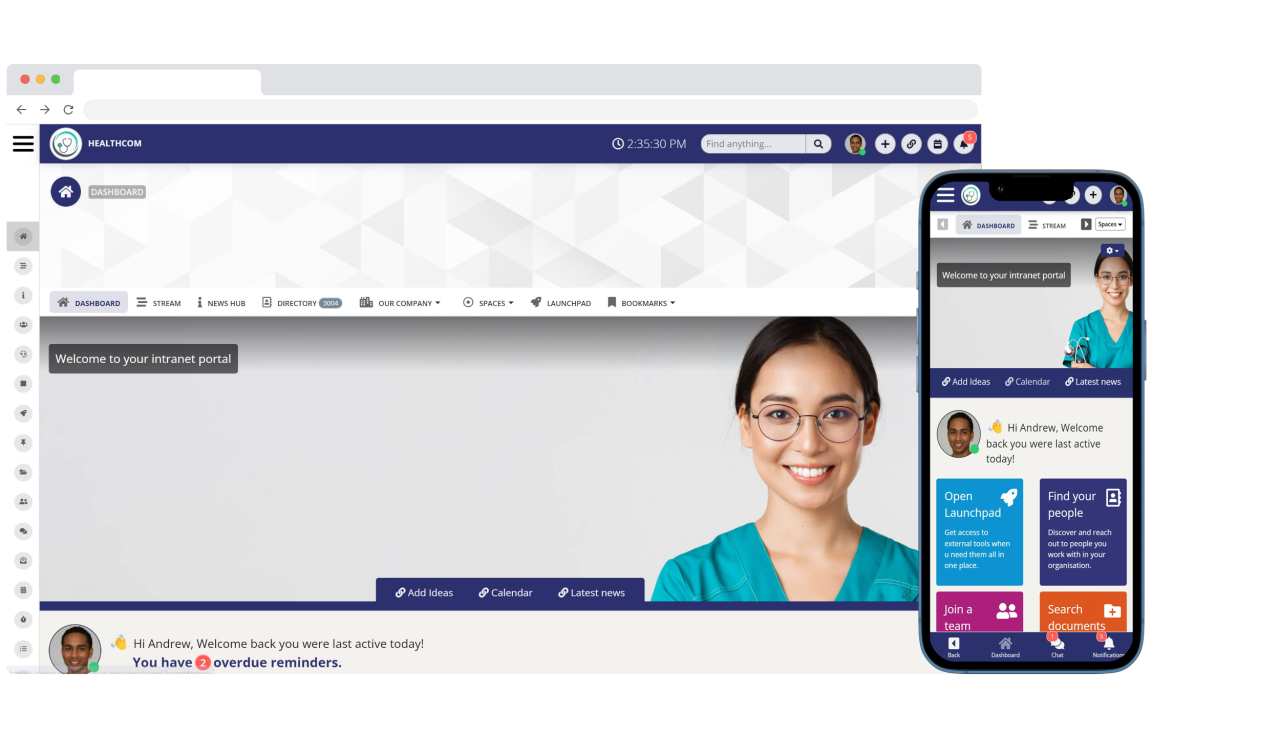Insight Blog
Agility’s perspectives on transforming the employee's experience throughout remote transformation using connected enterprise tools.
16 minutes reading time
(3167 words)
How does AI affect Corporate Training? A Complete Guide
How does AI affect corporate training? Explore the effects of AI on corporate training and its implications for employee development and organizational growth.
It should be clarified when addressing "How does AI affect corporate training?" that AI has been a vital factor of the transformation of the corporate training and education landscape.
The AI is integrated into the training programs which provide innovative avenues for learning. It provides personalized delivery of content, feedback mechanisms in real time, distribution and use of content. Therefore, changing how the training content is composed, shared and distributed.
With the advancements taking place in the business space at a rapid rate, one cannot overstate the importance of adapting to AI-driven learning modalities.
Companies that make good use of advanced technologies stay competitive through constant assurance of their staff upskilling, addressing different learning needs, and creating a culture that promotes constant renovation and development.
What is Corporate Training?
Corporate training involves systematically educating employees through various learning programs to enhance their skills and knowledge.
It serves as a vital catalyst for employee success, consequently contributing to the overall success of the business or organization. Employees perceive training as essential to their professional development, with a LinkedIn survey revealing that 94% of employees would remain with a company that invests in their learning needs.
A famous avenue for online corporate training or corporate training courses is the Learning Management System (LMS), which streamlines training processes and facilitates the evaluation of employee performance while enabling monitoring of their progress.
The LMS industry is experiencing rapid growth yes Ai and corporate training online free, with market projections indicating a surge from USD 8.76 Billion in 2019 to an anticipated USD 38.10 Billion by 2027.
- Onboarding Programs: Orientation sessions and training materials designed to familiarize new employees with company policies, culture, and job responsibilities.
- Skill Development Workshops: Workshops and seminars aimed at enhancing specific skills relevant to employees' roles, such as communication, leadership, or technical skills.
- Online Courses: Access to eLearning platforms offering a wide range of courses on topics ranging from software proficiency to management techniques, allowing employees to learn at their own pace.
- Certification Programs: Opportunities for employees to obtain industry-recognized certifications related to their field, demonstrating competence and enhancing career prospects.
- Team Building Activities: Activities and exercises aimed at fostering collaboration, communication, and trust among team members, often conducted through workshops or outdoor events.
- Cross-Training Initiatives: Programs that expose employees to different departments or roles within the organization, broadening their skill set and promoting versatility.
- Feedback and Coaching Sessions: Regular feedback sessions and one-on-one coaching meetings between employees and supervisors to provide guidance, address challenges, and set development goals.
- Simulations and Role-Playing Exercises: Interactive exercises that simulate real-world scenarios, allowing employees to practice problem-solving, decision-making, and customer interactions in a risk-free environment.
- Continuous Learning Initiatives: Encouraging a culture of lifelong learning by providing resources, incentives, and opportunities for ongoing professional development beyond formal training programs.
How has corporate training evolved over the years?
For decades, corporate training methods have continuously evolved to adapt to the changing demands of the workforce and the dynamic landscape of business and technology. With the advent of the internet in the workplace, training shifted from traditional classroom settings and printed materials to eLearning platforms powered by computer-based Learning Management Systems (LMS).
These systems incorporated quizzes and multimedia elements like audio and graphics, offering a more interactive learning experience.
The rise of smartphones and faster internet connections in the 2000s led to the widespread integration of streaming video in training initiatives. Additionally, app-based learning programs became popular, allowing users to access assessments and skill-enhancement materials anytime, anywhere.
This ushered in a new era of flexibility and scalability in training, empowering learners to progress at their own pace and utilize their preferred devices. However, these advancements also increased data insights for program creators, a potential now being fully realized through AI-driven corporate learning solutions.
Understanding AI in Corporate Training
In corporate training, integrating AI (Artificial Intelligence) represents a pivotal advancement, facilitating a seamless connection between machine intelligence and the learning process. This incorporation of AI serves multiple purposes, including tailoring training programs to individual needs, accommodating large cohorts of trainees, and automating administrative tasks for trainers.
At its core, AI in corporate training harnesses algorithms and models designed to mimic human neural networks, creating a versatile platform capable of supporting various learning styles and preferences. This encompassing set of functionalities extends beyond mere administrative automation to encompass the customization of content to suit individuals' diverse learning demands. Moreover, AI empowers trainers to predict and optimize learning outcomes, ensuring a more efficient and effective training process.
A fundamental shift AI facilitates in corporate training is the departure from traditional, one-size-fits-all training methodologies towards a data-driven and dynamic approach. This paradigm shift enables the alignment of training objectives with overarching business goals, fostering synergy between education and organizational strategy.
At its core, AI in corporate training harnesses algorithms and models designed to mimic human neural networks, creating a versatile platform capable of supporting various learning styles and preferences. This encompassing set of functionalities extends beyond mere administrative automation to encompass the customization of content to suit individuals' diverse learning demands. Moreover, AI empowers trainers to predict and optimize learning outcomes, ensuring a more efficient and effective training process.
A fundamental shift AI facilitates in corporate training is the departure from traditional, one-size-fits-all training methodologies towards a data-driven and dynamic approach. This paradigm shift enables the alignment of training objectives with overarching business goals, fostering synergy between education and organizational strategy.
Additionally, AI-driven systems can adapt to specific learning needs, harmonizing training targets with evolving business requirements, enhancing the overall learning experience and maximizing the impact of training initiatives.
AI (Artificial Intelligence) in Corporate Training refers to integrating advanced technological systems to enhance and optimize employee learning and development initiatives within organizations. This incorporation of AI encompasses various functionalities and applications aimed at revolutionizing traditional training methodologies.
Critical aspects of AI in corporate training include:
- Personalized Learning: AI algorithms analyze individual learning patterns, preferences, and performance data to deliver customized learning experiences tailored to each employee's needs and skill levels.
- Adaptive Content Delivery: AI-powered systems dynamically adjust training content, pacing, and difficulty levels based on real-time feedback and learner progress, ensuring optimal engagement and knowledge retention.
- Predictive Analytics: AI algorithms analyze vast amounts of data to predict future learning outcomes, identify potential skill gaps, and recommend targeted interventions to optimize training effectiveness.
- Virtual Reality (VR) and Augmented Reality (AR): AI-driven VR and AR technologies create immersive learning environments that simulate real-world scenarios, allowing employees to practice skills and behaviors safely and interactively. Incorporating computer vision applications within these AR and VR training modules can further enhance the interactive learning experience by enabling more accurate and responsive environments that adapt in real-time to user interactions.
- Natural Language Processing (NLP): AI-powered NLP enables interactive conversational interfaces and chatbots that provide employees instant feedback, guidance, and support during training sessions.
- Automated Assessment and Feedback: AI algorithms automate the assessment process by evaluating employee performance, providing instant feedback, and generating personalized learning recommendations based on assessment results.
- Continuous Learning and Adaptation: AI algorithms continuously monitor and adapt training programs in response to changing business needs, industry trends, and learner feedback, ensuring that training remains relevant and effective over time.
Overall, AI in corporate training represents a paradigm shift towards more personalized, adaptive, and data-driven learning experiences that empower employees to acquire new skills, enhance performance, and drive organizational success in today's rapidly evolving business landscape.
Types of AI Technologies Being Used
The role of AI in corporate training is going to metamorphose with some technologies dramatically changing the whole training industry. One of the most important subsets of AI is machine learning (ML), which uses statistical and data mining techniques to learn via the experience and improves the accuracy by use without specific programming.
The use of it as a foundation is for training platforms which are intelligent that are geared towards the assessment of individual learner's performance as well as engagement to be able to adjust the learning material. Natural Language Processing (NLP) serves the purpose of interpretation and analysis of human speech and reactions. As a result, it will facilitate the interaction between learners and digital training tools in a more natural way.
It is behind the many chatbots and virtual assistants that people explore through the touch on their mobile phones or typing.
It actually elevates the experience by turning it into a more active and enjoyable type.
The application of ML and NLP has become the main pillar of AI aided corporate training systems in our time.
They allow the users to be guided through different learning paths, to receive instantaneous feedback and to interact with trainers virtually just like in a real one-to-one training session.
- Natural Language Processing (NLP): NLP enables computers to understand, interpret, and generate human language, facilitating applications such as language translation, sentiment analysis, and chatbots.
- Machine Learning (ML): ML algorithms enable computers to learn from data and improve performance without being explicitly programmed, powering applications like predictive analytics, recommendation systems, and fraud detection.
- Deep Learning: Deep learning is a subset of ML that involves artificial neural networks with multiple layers, allowing computers to learn complex patterns and representations from large datasets, driving advancements in image recognition, speech recognition, and autonomous vehicles.
- Computer Vision: Computer vision technology enables computers to interpret and analyze visual information from images or videos, enabling applications such as facial recognition, object detection, and medical image analysis. Companies offering computer vision development services can create advanced systems for visual recognition and analysis
- Speech Recognition: Speech recognition technology converts spoken language into text, enabling applications like virtual assistants, voice-controlled devices, and speech-to-text transcription systems.
- Robotics: Robotics involves the use of AI to control and automate physical machines or robots, enabling applications such as industrial automation, autonomous drones, and robotic surgery.
- Expert Systems: Expert systems are AI-based software applications that emulate the decision-making ability of human experts in specific domains, enabling applications like diagnostic systems, financial analysis tools, and recommendation engines.
- Autonomous Agents: Autonomous agents are AI systems capable of acting independently to achieve specific goals in dynamic environments, enabling applications like autonomous vehicles, autonomous trading systems, and virtual assistants.
These are just a few examples of the diverse range of AI technologies being used across various industries to automate tasks, make predictions, understand natural language, and mimic human intelligence in different ways.
The AI-influenced Changes in Corporate Training
Traditional vs Modern Training Methods
The shift from the existing modes of training to AI-enabled training using innovative tools in the corporate sector will symbolize a revolution in the approach towards employee training. The corporate training previously was considered as a physical event, which was largely a respond to bored and standardized materials endorsed by a one-size-fits-all strategy.
These methods, though convenient under certain circumstances, didn't have any features of adaptability and customization, which were much needed to provide students with the learning experience they desired.
On the contrary, the AI-driven training consists of dynamic, adaptive, and ever-changing learning environment with the help of AI. AI has dramatically increased the scope of customizing training to unbelievable extent.
It can enable to individualize learning and offer content accordingly to learner's performance and interests at "the right time". It is not only interesting for the employees, but it also improves their overall learning process by letting them focus on their personal weaknesses, finally leading to improved outcomes in less time.
Follow us and access great exclusive content everyday: Follow us on Google News
AI Technology Milestones
The steps of AI expansion in corporate training have been marked by multiple milestones which have played a crucial role in the evolution. In the very beginning AI's competence was restricted to providing analysis of the most basic data about learners like their goals and time spent on each activity. However, as time went by more sophisticated machine learning algorithms with natural language processing skills joined AI and created special routes and more precise real time feedback.
Another milestone was the appearance of intelligent tutoring systems and virtual assistants that supply access to any kind of information both around the clock and personified at the same time.
Today, the cutting-edge machine learning (ML) algorithms have significantly enhanced and perfected online learning predictive analytics. This is done by analyzing data to see what learners will have in the future and what outcomes they will achieve.
Due to this, companies will be able to customize their training programs to specific needs of current employees and the business at large to succeed in the present environment.
Taken together, these markers will create a chain of events for the revolutionary impact of AI on the corporate training practice, which is going to be efficient and modern as the working field of the future.
AI in Corporate Training: What are the Advantages?
You may also like: Best Apps for Employees: UPDATED 2022 – A Complete Guide
Personalization
An indisputable advantage is that it would make learning experiences more personal. AI systems are able to assess a learner's performance, preferences, pace, and later personalize the training to satisfy these needs.
This implies that each of its workers gets a learning program that is designed to suit their particular needs, which is helpful in mastering complex topics and keeping knowledge longer. Such dynamic learning environments endorse a more stimulating and effective training process that the end result will be improvement of all the trainees and the organization.
Accessibility and Flexibility
AI based training enables unrivaled accessibility in doing so and flexibility by which it can be employed. AI platforms allow workers to access training material at any time from anywhere in the world. Employees are able to study at the comfort of their preferred environment and at their convenience.
This is especially important today in globally distributed team settings where the teams can be spread across various time-zones. AI enables everyone, regardless of their location, to receive the same high-quality training, opening up new avenues of learning and ensuring equal job opportunities.
Free ebook: How To Get Your Intranet Off The Ground
Scalability
The ability to deliver corporate training at scale to thousands of members or employees is one of the AI advantages applied in training. The old-fashion training methods like in-person training or workshops have a limited capacity and they also cannot match a growing organization's needs.
The AI-driven learning systems, in contrast, can accommodate rather large numbers of employees (hundreds or even thousand) in a short time without a quality compromise.
This feature will be really useful for big enterprises or for companies that are growing fast and need to improve the skills of their workforce quickly.
Real-Time Feedback and Assessment
Lastly, AI provides immediate feedback and assessment, a feature that in turn makes the training process more fruitful. AI algorithms allow training platforms to keep track of learners' progress at all times, providing immediate feedback and indication of the areas that need to be improved.
The learning process is not only a tool to correct errors and strengthen the foundations of learners; it also give instructors a chance to see how each learner is progressing.
This information can be used by teachers to coordinate their learning experiences, curriculum update, or giving special tutoring to particular students.
Challenges and considerations
Despite the potential benefits of AI-based training programs, several challenges remain to be addressed to ensure a safe and effective learning experience for all participants. Among these challenges, one of the most significant is the ethical use of data. Since AI systems rely on substantial employee data to deliver personalized experiences, safeguarding data security and privacy is paramount. Training providers must implement measures to encrypt and securely store data, conduct regular audits, and limit data collection to only what is necessary for the course, avoiding collecting personal data whenever possible. When personal data is required, it should be anonymized or pseudonymized to minimize the risk of re-identification.
In addition to data concerns, other factors to consider when deploying AI training programs include:
- Employee resistance to AI.
- The potential for bias in AI algorithms.
- Compliance with SCORM (Sharable Content Object Reference Model) standards.
SCORM is a technical eLearning standard developed by the Advanced Distributed Learning (ADL) initiative to enhance interoperability between learning management systems and online courses. Ensuring compatibility with the SCORM model is crucial for scaling course design investments and facilitating seamless interactions across different devices and platforms.
While AI holds promise for transforming corporate training, it is essential to recognize that significant work is still required to ensure that AI-powered tools meet the necessary standards and deliver tangible benefits.
Future Possibilities of AI-driven Corporate Training
As AI advances rapidly, we can anticipate significant improvements in our overall experiences in the years ahead. As recommendation algorithm has evolved, we can expect more accurate personalized experiences and content suggestions. This will lead to greater engagement among users as they embark on tailor-made learning journeys that adapt seamlessly to their needs.
Moreover, interactions with AI programs are expected to become more natural. Advancements in natural language processing (NLP) and sentiment analysis will enhance AI's ability to understand and respond to emotions and queries. This will result in more human-like training interactions with chatbots and virtual assistants. Additionally, the rise of virtual reality (VR) and augmented reality (AR) will enable more immersive and engaging learning experiences.
These advances and improvements in NLP will allow learners to practice skills safely within virtual environments.
One of AI's most significant impacts on corporate training is its potential to create a future-proof workforce. A competitive labor market has increased job turnover rates, emphasizing the importance of employee retention for businesses. Providing learning and career development opportunities has emerged as a reliable strategy for retaining employees.
Businesses with strong learning cultures have reported increased retention rates from 30% to 50%.
The challenge for training providers is to deliver relevant learning opportunities that enable employees to grow continuously throughout their careers. As AI and automation continue to reshape the workplace, assisting employees in reskilling and remaining relevant could contribute to a more stable job market and foster an adaptable, agile workforce.
Ready to Unlocking Your Online Training and Employee Development Potential with AgilityPortal
Revolutionize your corporate training with AgilityPortal Learning Lab! Our cutting-edge platform offers a seamless blend of AI-powered technology and immersive learning experiences to elevate your training programs to new heights.
With our 14-day demo, you can experience firsthand how AgilityPortal transforms traditional training into dynamic, engaging sessions that drive results.
Say goodbye to outdated methods and hello to a future of agile, effective learning. Try the Best corporate training online platform today!
Wrapping up
The use of AI in corporations as a learning tool represents a huge shift in how companies train their employees. Through its personalized, accessible, and scalable training solutions, AI is not merely improving learning experiences but is also transforming them into more efficient, effective, and fun-filled journeys.
Despite the challenges, the expected outcomes make this an absolutely necessary investment for the future. Going forward, we can expect that AI technology will keep evolving and will play an even more important role in making corporate training a pillar of business growth and employee development.
Categories
Blog
(2698)
Business Management
(331)
Employee Engagement
(213)
Digital Transformation
(182)
Growth
(122)
Intranets
(120)
Remote Work
(61)
Sales
(48)
Collaboration
(41)
Culture
(29)
Project management
(29)
Customer Experience
(26)
Knowledge Management
(21)
Leadership
(20)
Comparisons
(8)
News
(1)
Ready to learn more? 👍
One platform to optimize, manage and track all of your teams. Your new digital workplace is a click away. 🚀
Free for 14 days, no credit card required.














